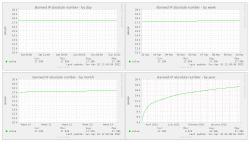Description
iblock is a software whose purpose is to detect TCP connections, on specific ports, in order to block the corresponding IP adresses, through Packet Filter.
The inetd service is responsible for active listening.
- Author: Solène Rapenne
- URL: https://tildegit.org/solene/iblock.git
- list of banned URLs: http://perso.pw/blocklist.txt
Installation
Let’s start with the copy of Git depository:
:$ git clone https://tildegit.org/solene/iblock.git
:$ cd iblock
Compile the binary — OpenBSD contains natively the appropriate tools:
:$ doas make
cc -o iblock main.c
; vérifions la présence du binaire
:$ ls -al iblock
-rwxr-xr-x 1 root moi 8496 Apr 10 12:23 iblock*
If the compilation phase does not run correctly, contact Solène!
Solène did not create the “install” target, so let’s copy it into the target directory:
:$ doas cp iblock /usr/local/bin/
:$ ls -al /usr/local/bin/iblock
-rwxr-xr-x 1 root wheel 8496 Apr 10 12:26 /usr/local/bin/iblock*
Let’s move to the configuration:
Configuration
_iblock
In first, create a dedicated user, named _iblock:
:$ doas useradd -s /sbin/nologin _iblock
doas
- Configuration file:
/etc/doas.conf
Now, add the below rule into the doas configuration file to allow the
dedicated user to use pfctl:
permit nopass _iblock cmd /sbin/pfctl
inetd
- Configuration file:
/etc/inetd.conf
Configure the inetd service:
666 stream tcp nowait _iblock /usr/local/bin/iblock iblock blocked_tcp
666 stream tcp6 nowait _iblock /usr/local/bin/iblock iblock blocked_tcp
- 666: used port — of course, you can change…
- the _iblock user manage the binary
iblock - the last argument: the name of the added parameter to the IP addresses stored in the PF table.
And, now, let’s active and start the service:
:$ doas rcctl enable inetd && doas rcctl start inetd
shutdown
Create a “backup” file to make the future table persistent in PF, on server shutdown and restart:
:# touch /etc/pf-blocked_tcp.txt
And, create|modify the /etc/rc.shutdown file:
pfctl -t blocked_tcp -T show > /etc/pf-blocked_tcp.txt
PF
Here is an instance of rules to add to Packet Filter:
- one variable, named block_tcp_ports: a set of ports to monitor
- one persistent table, named blocked_tcp.
- the blocking rule, labeled iblock.
- the two ultime rules analyze the TCP flow, on IPv(4|6) protocols, by active listening on the stored ports into the block_tcp_ports variable, and then redirect on the local interface, to the port 666.
block_tcp_ports = "{ 21 23 111 135 137:139 445 1433 3306 3389 5432 6000:6010 7890 9999 25565 27019 }"
table <blocked_tcp> persist file "/etc/pf-blocked_tcp.txt"
### iblock: block all in table
block in quick from <blocked_tcp> label iblock
### iblock: redirect to inetd service on localhost
pass in quick on egress inet proto tcp to port $block_tcp_ports rdr-to 127.0.0.1 port 666
pass in quick on egress inet6 proto tcp to port $block_tcp_ports rdr-to ::1 port 666
I add: X11, Goaccess, pfstat; it’s up to you…
(this applies to any service you host!)
Remember: reload the rule set:
:$ doas pfctl -f /etc/pf.conf
Monitoring
But, who is the monitor?
⇒ The activity is recorded in the two logs ‘daemon’ and ‘messages’.
:$ grep iblock /var/log/messages
Apr 10 12:26:38 sh1 iblock: blocking 46.23.148.71
Apr 10 12:30:28 sh1 iblock: blocking 180.225.98.236
Apr 10 12:31:48 sh1 iblock: blocking 46.23.157.246
Apr 10 12:32:43 sh1 iblock: blocking 95.57.218.103
Apr 10 12:36:00 sh1 iblock: blocking 103.89.91.158
Apr 10 12:38:41 sh1 iblock: blocking 23.128.248.41
⇒ Also, pfctl can show us the different IP addresses registered into
the PF table:
:$ doas pfctl -t blocked_tcp -T show
23.128.248.41
46.23.148.71
46.23.157.246
95.57.218.103
103.89.91.158
180.225.98.236
or event to use it to find the related statistics to — see documentation for column meaning:
:$ doas pfctl -sl | grep iblock
iblock 44666 1188 58504 1188 58504 0 0 0
⇒ It’s possible to monitoring the user _iblock — but, in this case, not very useful:
top -U _iblockfstat -u _iblock -nps aux -U _iblock
munin
If you want to get statistics with munin , Solène provided me a script, to be executed with the rights of the user _munin:
#!/bin/sh
if [ "$1" = "config" ]; then
echo "graph_title Banned IP absolute number"
echo "graph_vlabel gauge"
echo "a1.label value"
exit 0
fi
printf "a1.value "
doas /sbin/pfctl -t blocked_tcp -T show | sort -n -u | awk 'END { print NR }'
This need to modify the configuration of doas to allow the user
_munin to use pfctl:
# iblock: auth _munin-plugin to use pfctl
permit nopass _munin-plugin cmd /sbin/pfctl args -t blocked_tcp -T show
Below, here a view of statistics of blocked IP addresses, gived by Solène,
Ci-dessous, voici une image de statistiques d’adresses IP bloquées, restituée par Solène, on 2022/10/04:

Troubleshooting
Into the both logs ‘daemon’ and ‘messages’, see the message:
inetd[69849]: execv /usr/local/bin/iblock: No such file or directory
Make sure you have compiled and copied the iblock binary to the target directory!
Voila!